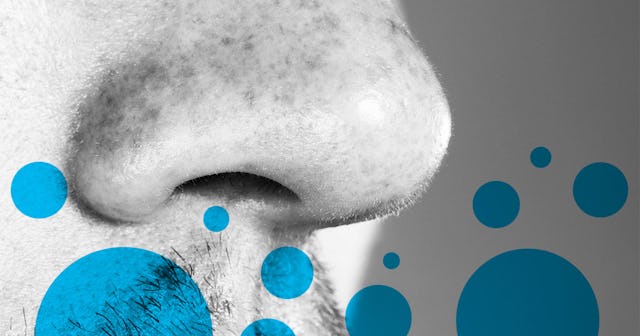Please, For The Love, Don't Put Baby Shampoo Up Your Nose As A 'Cure' For COVID-19

Almost as soon as the World Health Organization declared the novel coronavirus a global pandemic, the “cures” and “preventative measures” began to circulate the Internet. The first one I remember was a self-check for COVID—back when testing was woefully scarce—and instructed you to hold your breath for ten seconds every morning. If you could, that meant you didn’t have COVID-19. Confession: there were definitely a few mornings when I woke up and held my breath, just to make sure, and breathed a sigh of relief when I could. My logical mind knew not to believe medical advice I received in an email from a distant relative, but my terrified-and-desperate-for-answers irrational mind thought: what’s the harm in that little self-check.
The harm, of course, we now know is that the ability to hold your breath or not has no bearing on whether you’re infected and contagious—COVID-19 doesn’t always cause difficulty breathing. More importantly, if you are sick and avoiding getting a COVID test—and thereby medical help—until you can’t hold your breath for ten seconds, you’re probably waiting too long.
Since those early March days, the number of COVID-19 cures and preventatives have only kept coming: gargling with salt water, taking unproven and potentially dangerous anti-malaria drugs without a doctor’s prescription or supervision, injecting bleach… (Please don’t do any of these.)
Most recently, two “cures” have been making the Internet rounds involving baby shampoo as a nasal rinse and mouthwash as an oral rinse to inactivate coronavirus by disrupting the membrane around the virus. The origin of both of these “cures” came from a study from the Journal of Medical Virology, where researchers tested a variety of nasal rinses and mouth washes on cells infected with ordinary coronavirus. They found that “a 1 percent baby shampoo nasal rinse can inactivate the virus after two minutes; with antiseptic mouthwash, 30 seconds.”
But please don’t go out and start squirting baby shampoo up your nose or believing you’re safe from COVID-19 because you’ve used a mouthwash. These ideas are not based on substantial or credible research. The study results are encouraging findings, sure, but they are also full of limitations, that are very clearly acknowledged by the authors of the study, who state, “Several possible limitations of this work must be acknowledged.”
Karolina Grabowska/Pexels
For starters, the study tested these nasal rinses and mouthwashes against an ordinary coronavirus. COVID-19 has proven it’s anything but ordinary. Second, the study took place in a petri dish, with conditions that are commonly used for studies, but that do not necessarily “represent the true nature of the nasopharyngeal endothelial ecosystem.” Meaning—your nose and mouth have a lot more crevices and organisms than a smooth petri dish in a laboratory and what works in a glass petri dish won’t necessarily work in your mouth. Humans are so much more complex than petri dishes. And finally, the authors note the physical act of rinsing may either help viral load reduction or decrease the effectiveness of the shampoo or mouthwash by lessening the contact time with the virus particles.
The reality is: we (experts and laypeople) don’t know what to make of this study yet. In an interview with CBSN Pittsburgh, Dr. Randolph Peters of Allegheny Health Network family medicine confirms that, “There might be some theoretical, minuscule benefit. In terms of the disease itself and stopping the transmission, it’s interesting information, but it’s not useful at this point.” This early study might result in a breakthrough, but it might not.
In the meantime, baby shampoo and mouthwashes should be used only as directed. On their own website, Listerine—the makers of popular mouthwash—urge consumers to use their products as directed and remind consumers that “LISTERINE® mouthwash has not been tested against any strains of coronavirus,” and also that, “LISTERINE® mouthwash is not intended to be used, nor would it be beneficial as a hand sanitizer or surface disinfectant.”
The important point to remember about this study is that it’s very preliminary and full of limitations. Nasal rinses and mouthwashes are not substitutes for health measures that are known to make a difference in transmission—such as social distancing and masking. The real danger of these unproven “cures,” “treatments,” and “self-checks” is that they provide folks with a false sense of security, and might encourage people to act more recklessly than they otherwise would.
We all want to protect ourselves, our families, and our communities from this virus. We all want to feel like we have some iota of control over our lives. More than that, we all would love to find the secret key that makes COVID-19 vanish, disappear like a bad memory. But none of these so-called cures or preventative treatments are going to help. They are all based on, at best, preliminary studies that have not yet taken the work beyond a petri dish, and at worst, on false claims made up by someone in their basement either looking to make a buck or cause harm.
The best way to stay safe and to take control from COVID-19 is listen to the experts (who will not be announcing their secrets in emails forwarded by your second cousin who heard from a friend), and to mask up, maintain social distance, and avoid crowds.
Information about COVID-19 is rapidly changing, and Scary Mommy is committed to providing the most recent data in our coverage. With news being updated so frequently, some of the information in this story may have changed after publication. For this reason, we are encouraging readers to use online resources from local public health departments, the Centers for Disease Control, and the World Health Organization to remain as informed as possible.
This article was originally published on